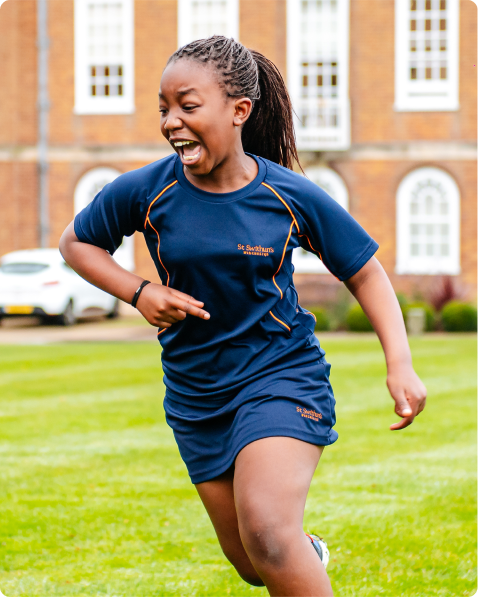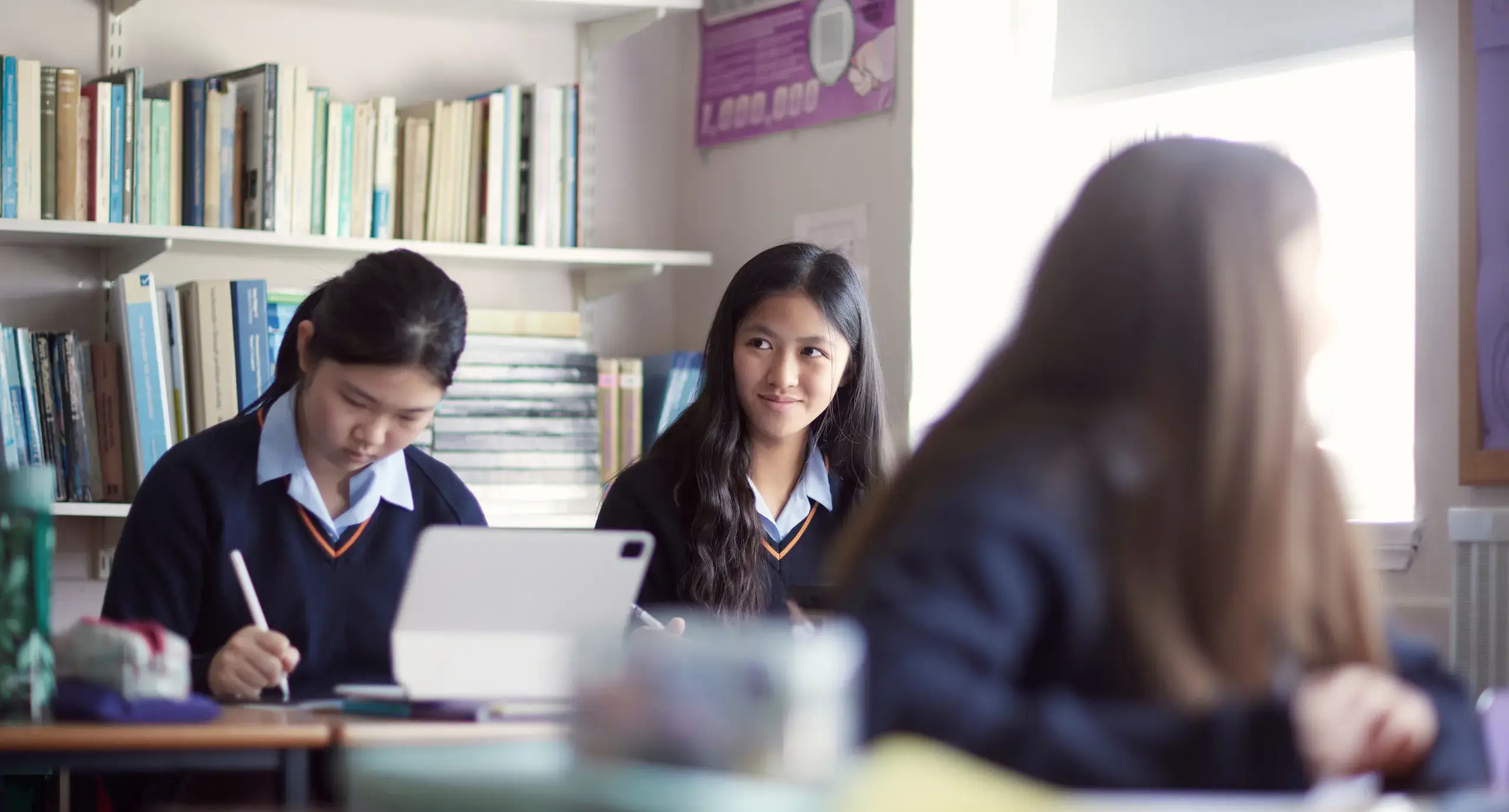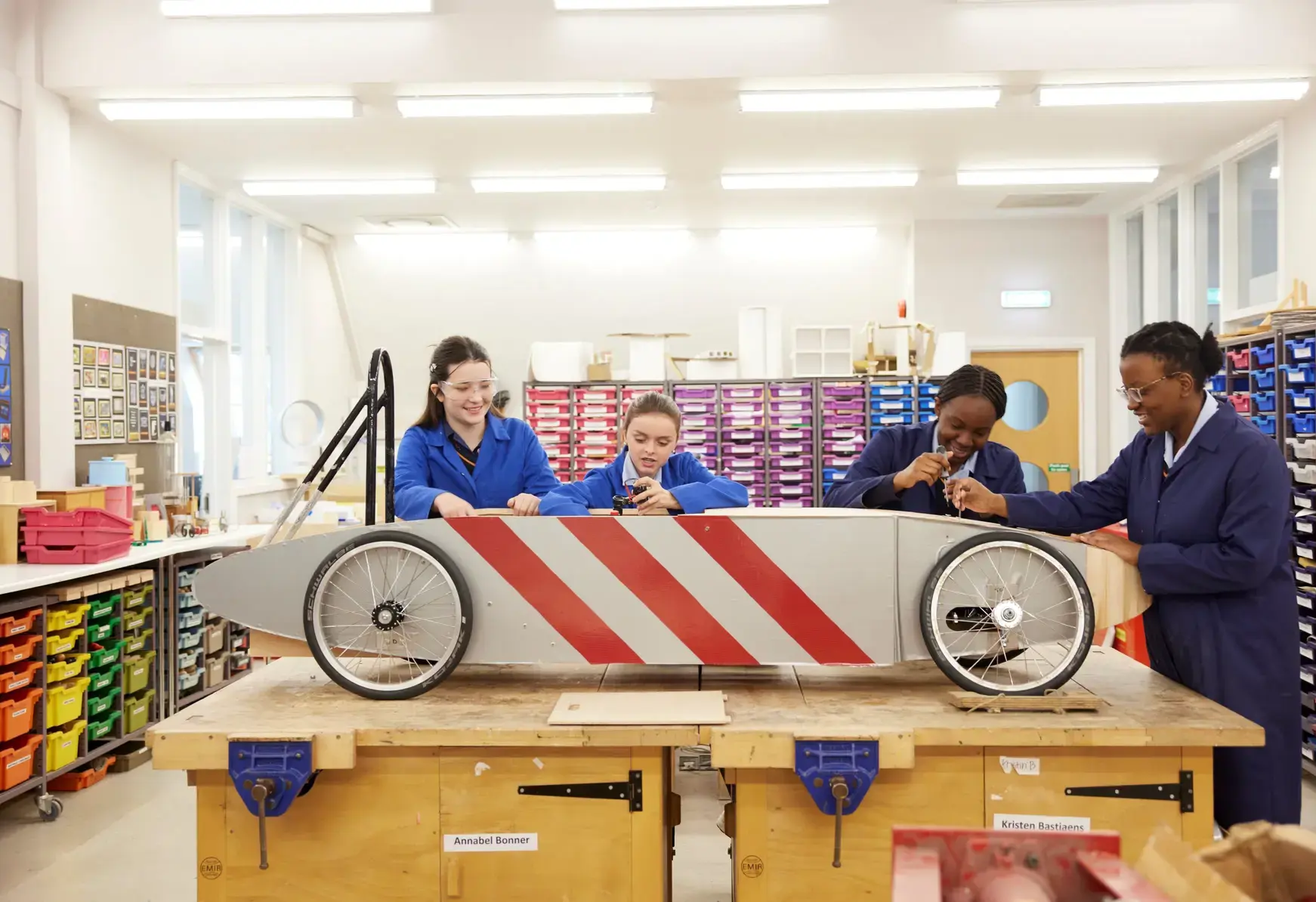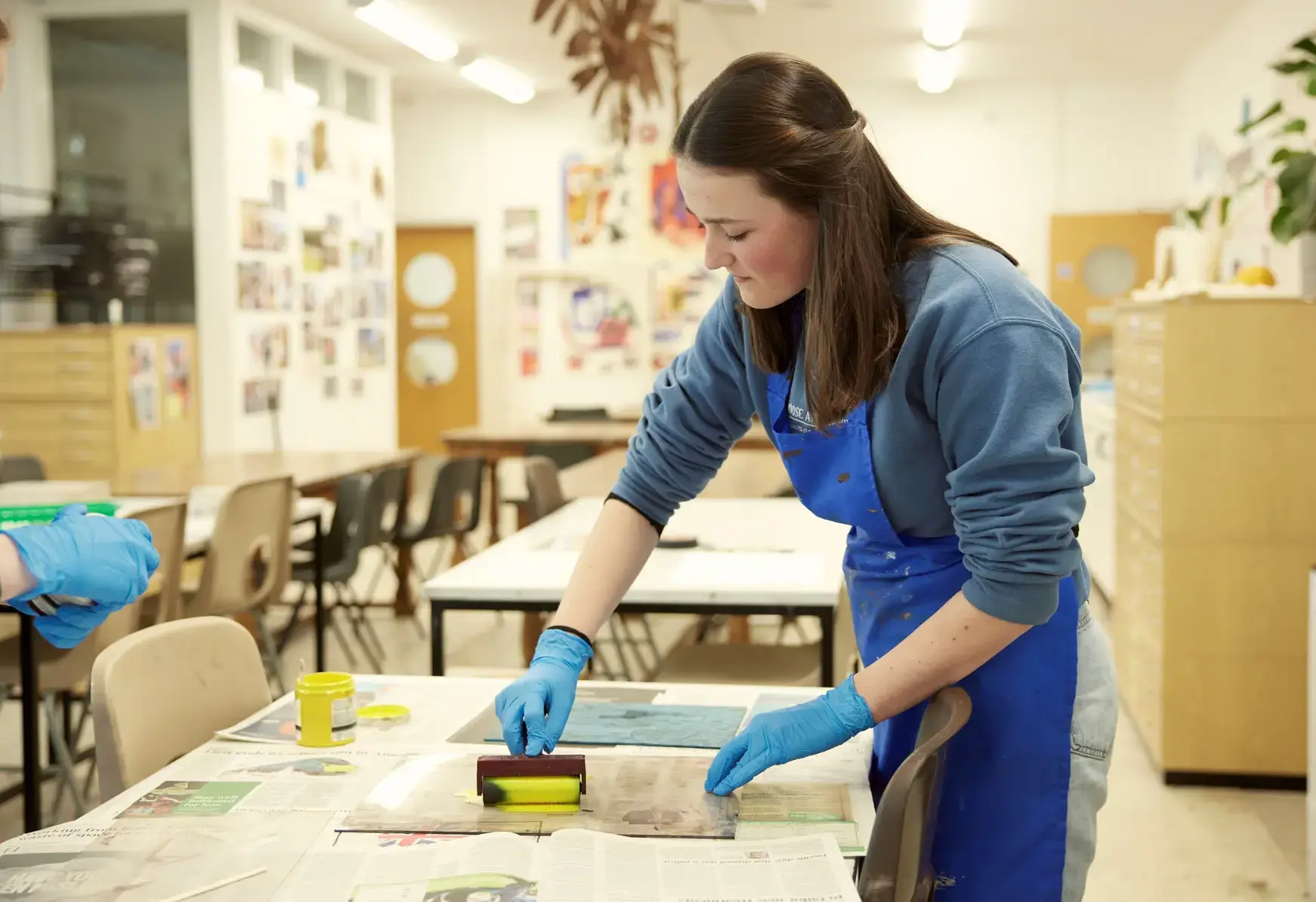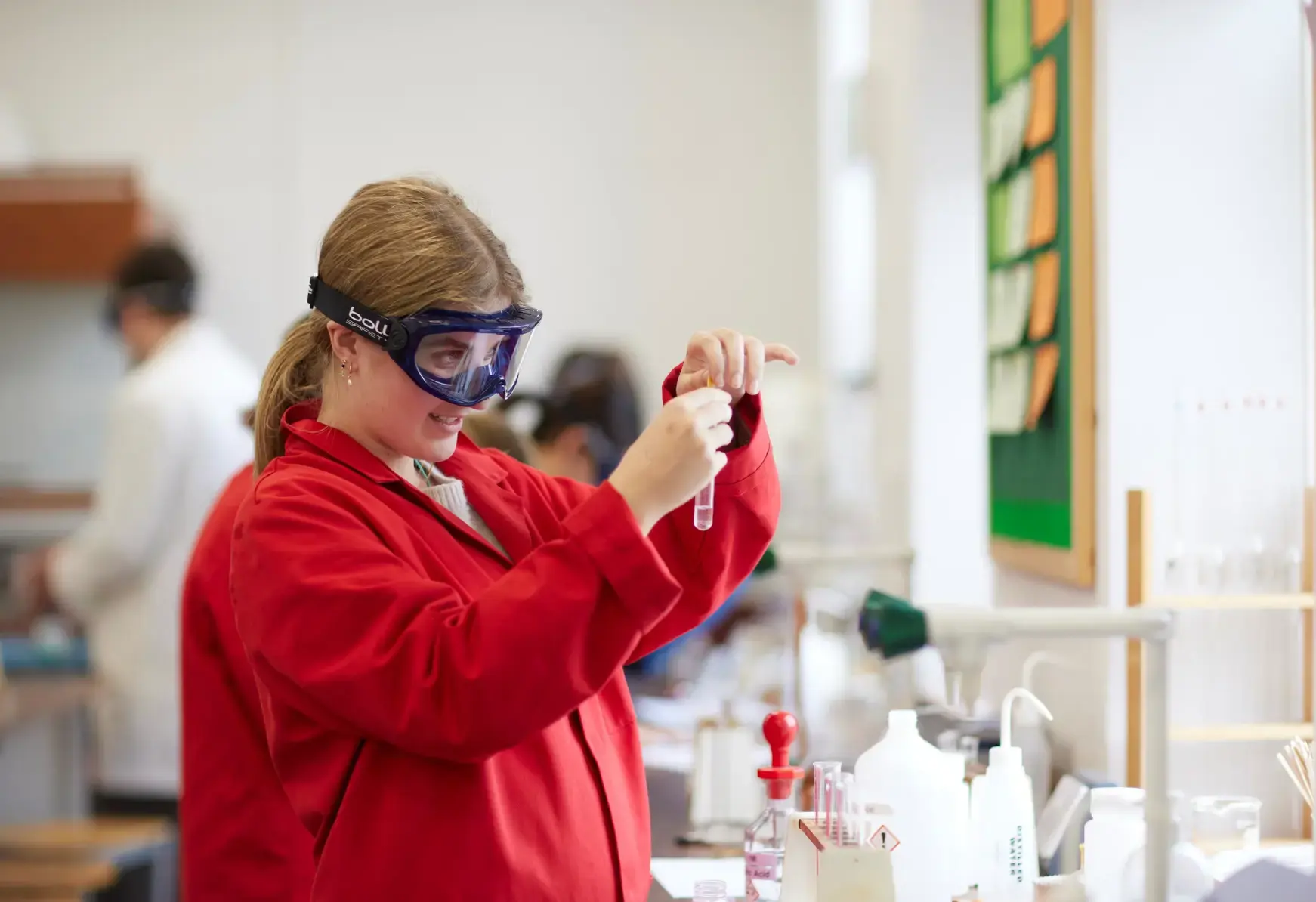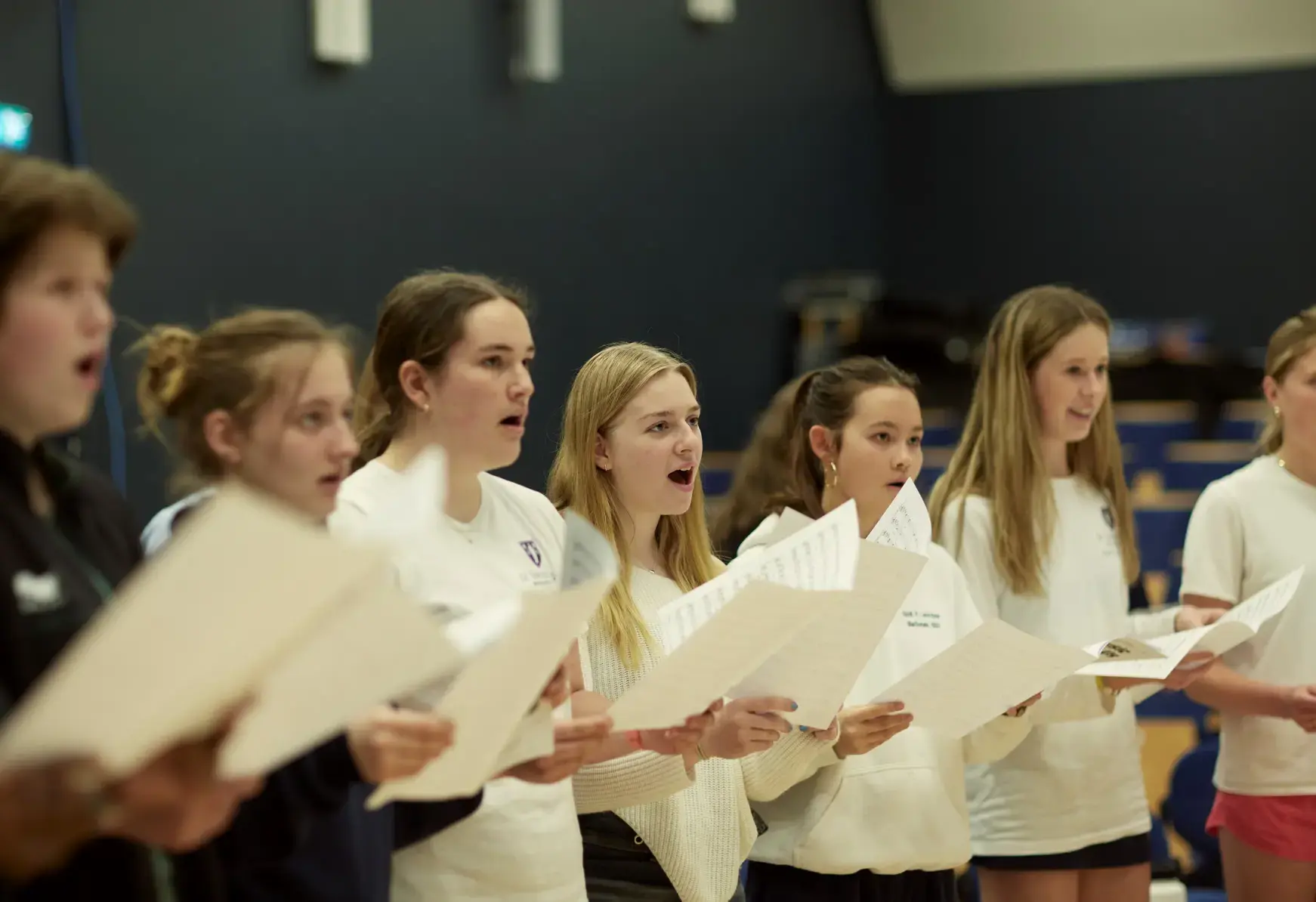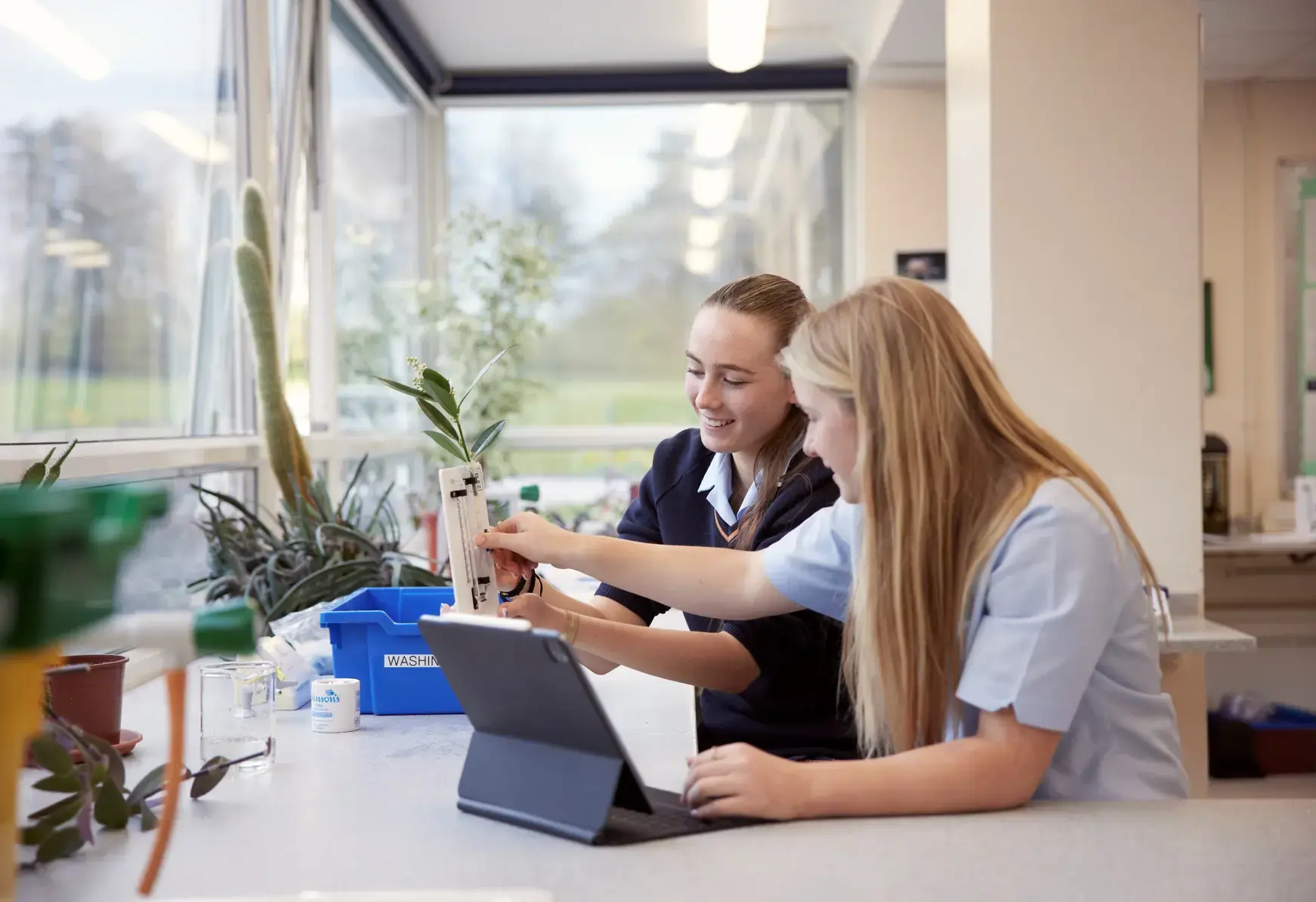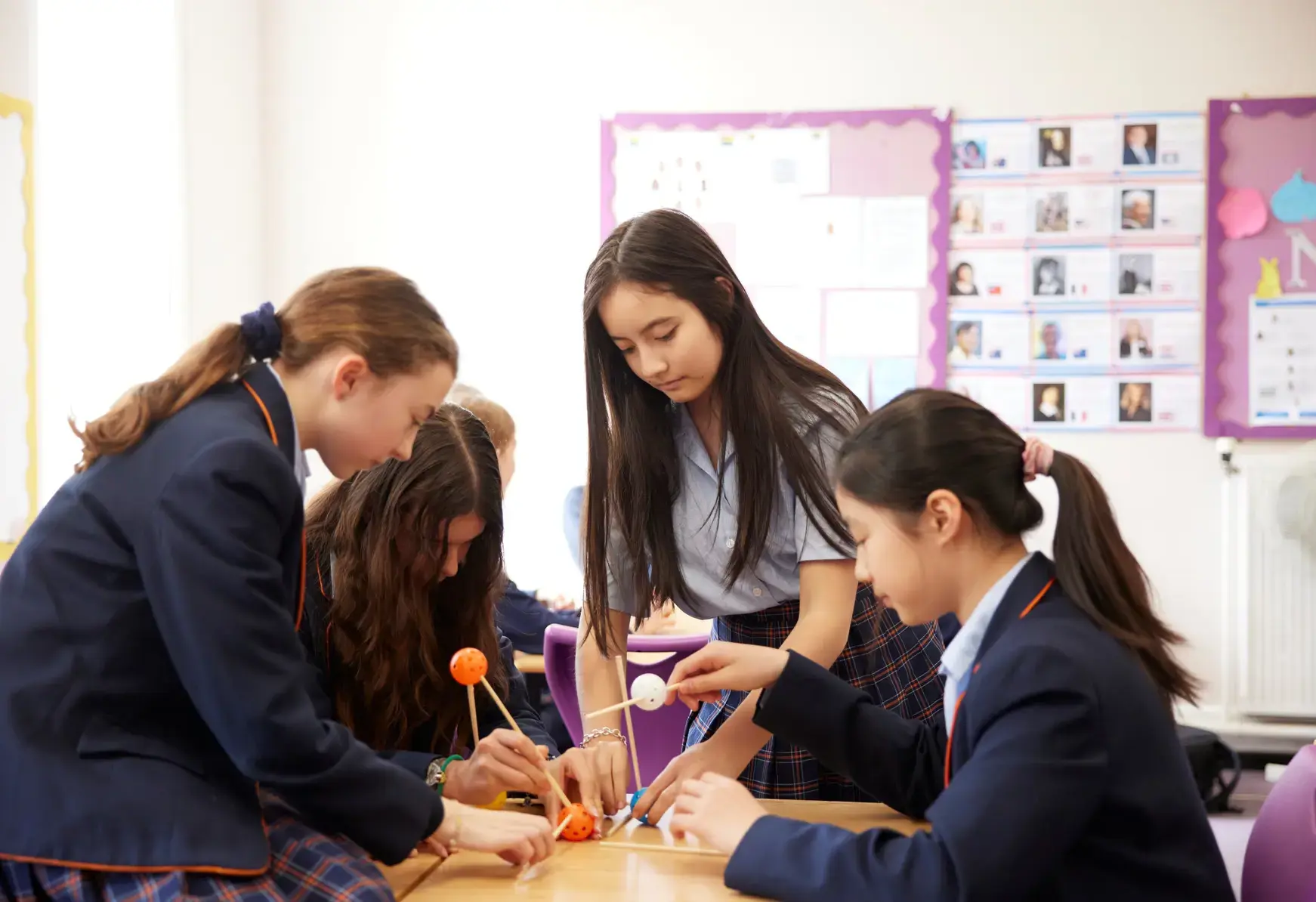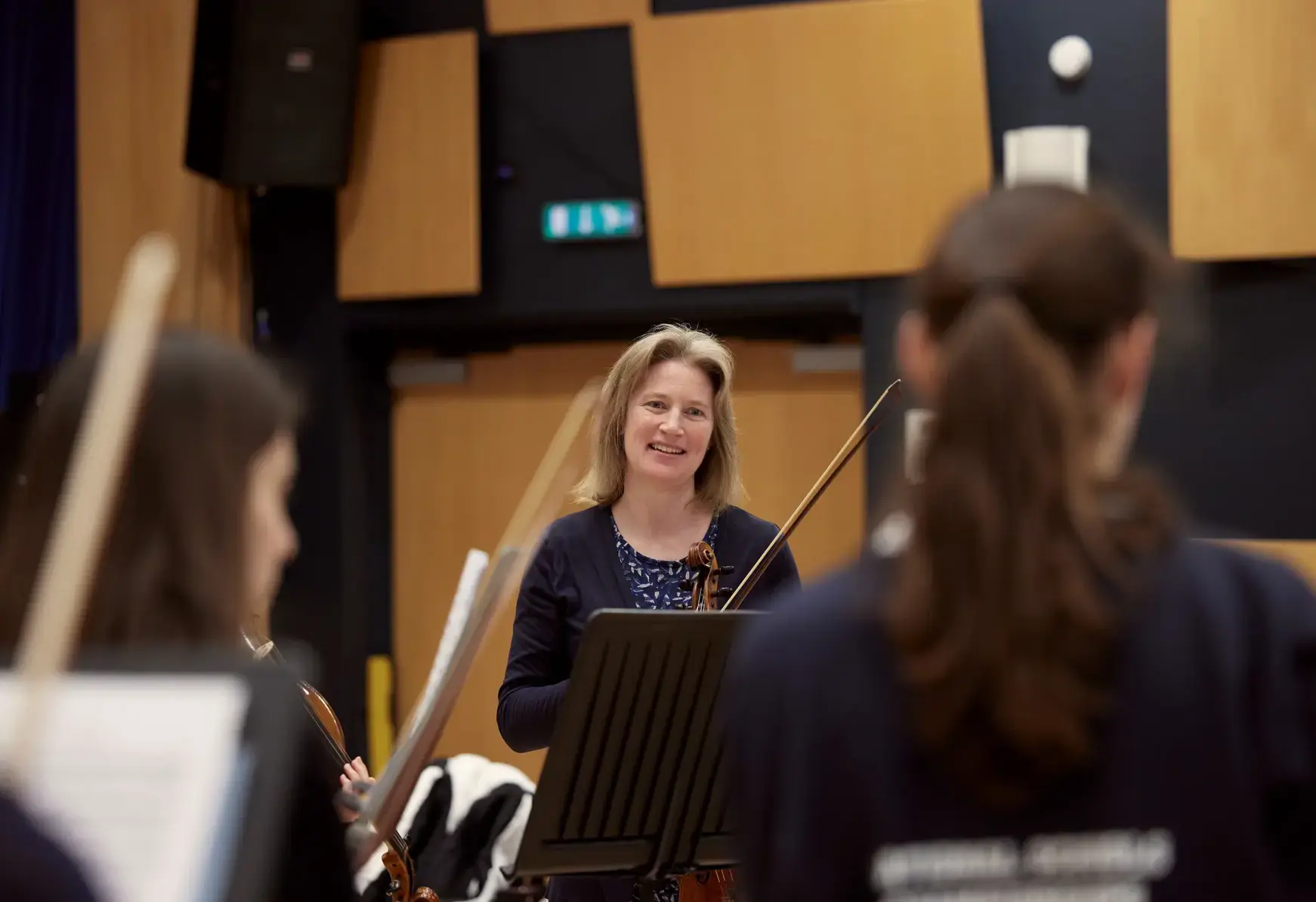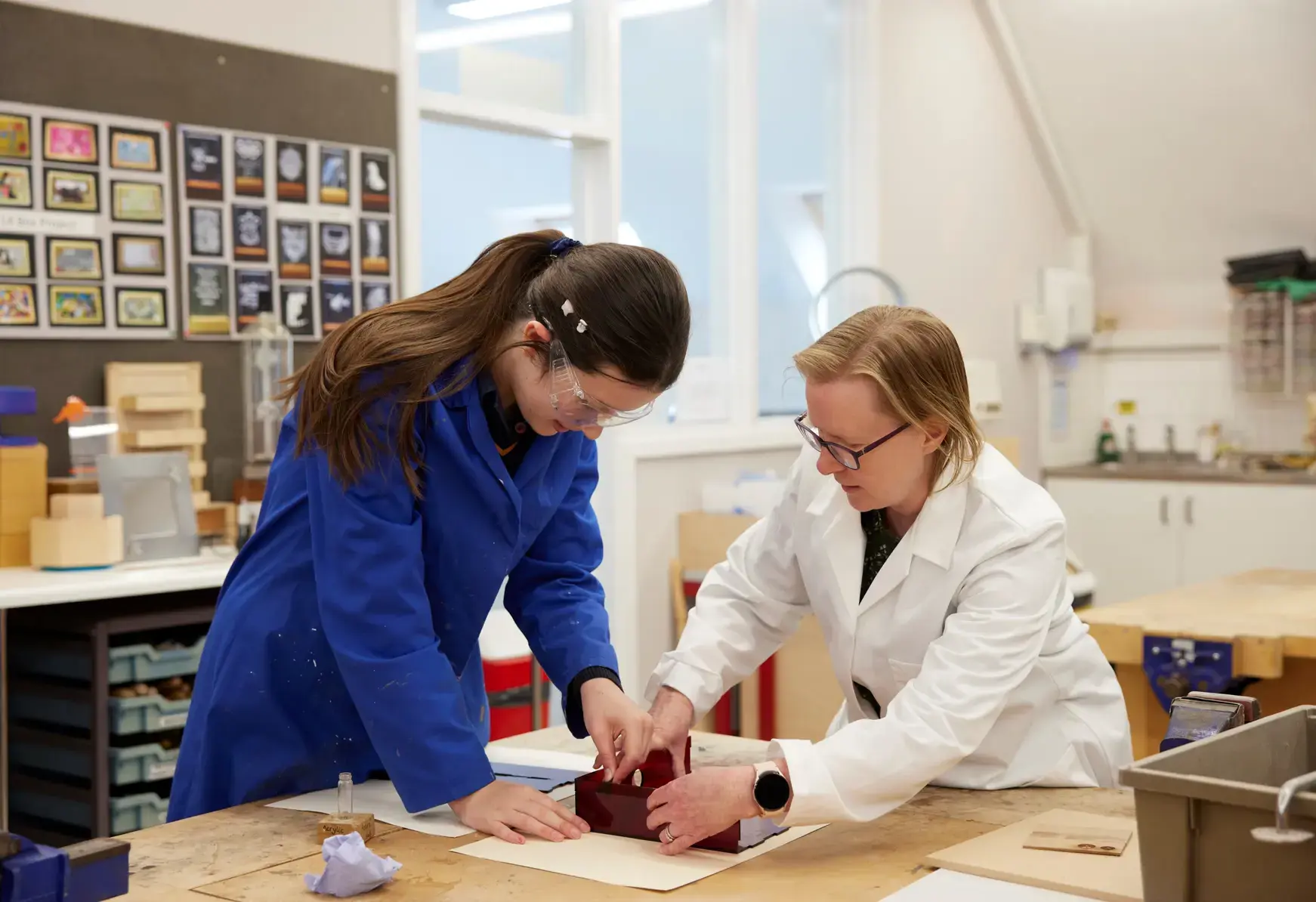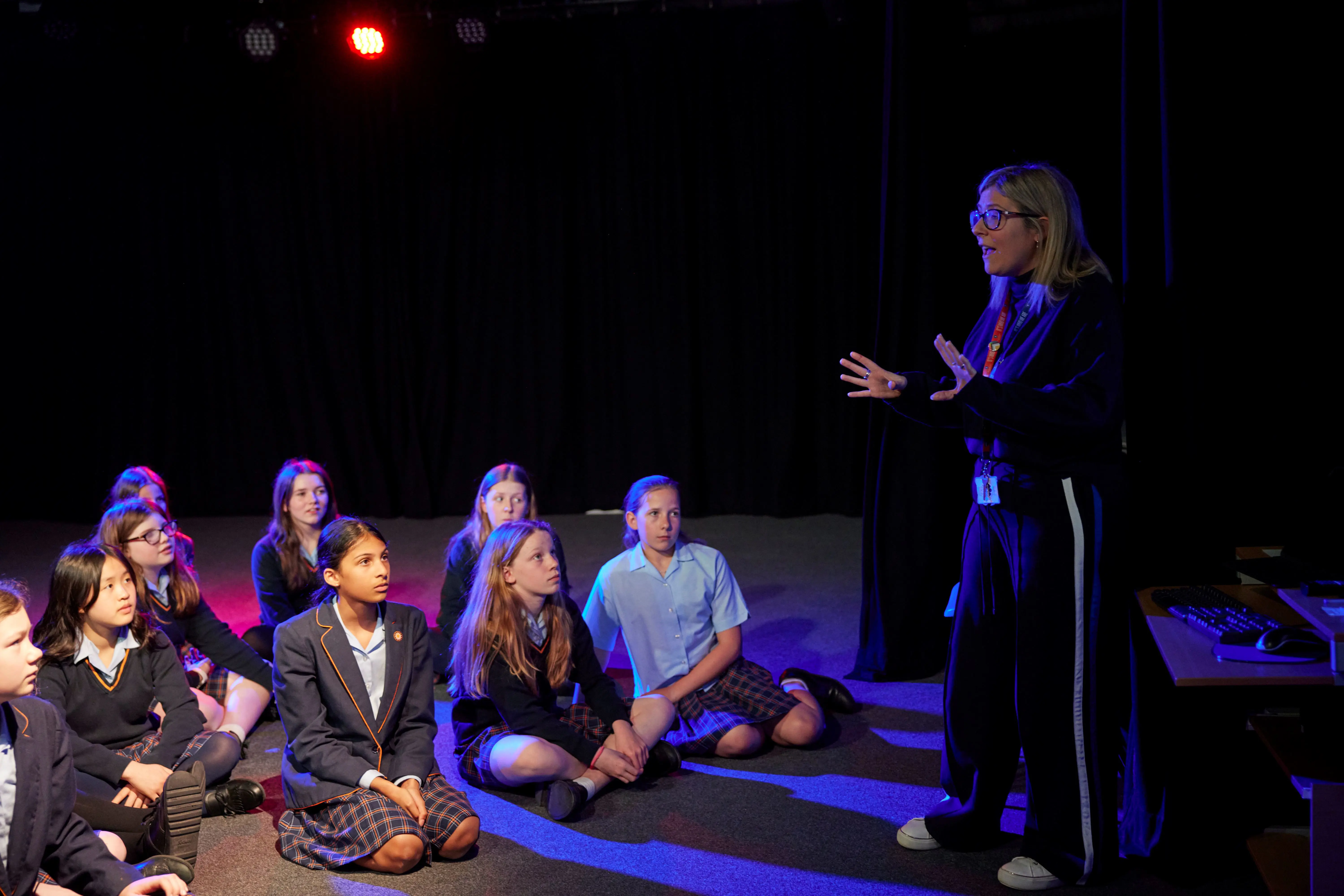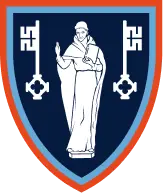 |
We offer a wide array of subjects across many departments at St Swithun’s. Please take a look at the sections below for more information on each. |
| Art |
|---|
|
We offer an exciting and stimulating environment where girls can feel confident in expressing their individual ideas and perspectives. The department has three teachers, a technician and a huge range of facilities. As a team we are able to offer an enormous variety of skills and techniques from ceramics, painting, printmaking, sculpture, textiles and photography to regular life-drawing with the older girls. Art History is taught as a separate subject and is an important part of our sixth-form curriculum. Teaching is vigorous and wide-ranging. We encourage an atmosphere of exploration, experimentation, determination and independence. |
| Biology |
|
Life is an extraordinary phenomenon. How is it that this green planet we live on, with its incredible range of organisms, was only a mixture of chemicals several million years ago? How amazing, that once there were only the simplest organisms, and now there is such a range of biodiversity with extremely complex living organisms, each species perfectly adapted to its environment. Most remarkable, is that we humans, Homo Sapiens, have such a big brain, so that we can reason, innovate, learn, control and understand our environment, and yet we still age, succumb to disease and die. This is what makes biology so exciting. Studying biology is an excellent prelude to a medical, dental or veterinary science degree, relying on learning empathetic skills, with concern for society. You will become a more agile thinker, with an enquiry-led and open-minded approach to the many health issues that we face. It will ensure you develop big picture, connection finding and analytical skills to understand the environmental issues of the 21st century, such as the COVID-19 pandemic, and long-term effects of climate change on global ecosystems. Biology is fascinating because you will discover how life works, learning how to self-regulate and develop intellectual confidence, studying at the molecular, cellular, organism or population level. It includes elements of both physics and chemistry but is easy to apply to everyday-life examples. It is a highly visual science, and you will develop thinking and collaborative communication skills in a scientific context. We discuss some of the most interesting new areas of biology, genetic manipulation and assisted reproduction. Decisions made by governments and individuals involve using ethics as a tool, so you will learn through practice to see alternative perspectives and to evaluate and weigh up opposing arguments. We have a very wide range of theoretical and practical activities in our lessons, and we complement these with field trips. A level biologists have lectures from speakers, both in and out of school, and can join the Medical, Dental, Veterinary or Scientific Journal Societies. Sixth-form biologists also have the opportunity to compete in the Biology Intermediate and Olympiad, and those in year 9 the Biology Challenge. As a department, we are always looking for new ways to make biology an exciting and rewarding subject to study. |
| Chemistry |
|
Chemistry is the study of matter: the atoms, molecules, and larger structures that make up everything in our world. You would be hard-pressed to find an aspect of your daily life that isn’t affected by chemistry research. Chemists invent and design materials that are vital to modern civilisation: from the medicines that cure us when we are sick to the electronics in our pocket. They are also vital to our quest for sustainability – for example discovering new ways to capture the sun’s energy or inventing new plastics which don’t take hundreds of years to decompose. The study of chemistry involves relating the visible with the microscopic. You will explore increasingly complex models for atoms and the manner in which they interact with each other. You will have the chance to investigate the properties and reactions of the elements, as well as exploring the vast array of organic molecules that make up the living world. At each stage, you will be supported by expert teachers who aim to foster enthusiasm and curiosity in their students. We believe that chemistry is something you do, as well as something you study, and through extensive practical work you will develop skills in planning, problem-solving and self-reliance. You will be captivated by chemistry and we can’t wait to see your reaction! |
| Classics and classical Civilisation |
|
Where do we come from? It’s a question we all ask almost as soon as we can talk, and there are a number of different answers – but one of the most important and rewarding answers can be found in the study of Classics, in the shared cultural heritage of the past of ancient Greece and Rome which has such a huge impact on our lives today. Learning to read Latin and Greek (both a joy in themselves for the beauty and precision of their grammar as well as the evocative power of their expression) opens a door into understanding our society through exploring where it came from and the forces which shaped it. It’s hard to think of a more compelling story than the Trojan War, or Odysseus’ long journey home from it. It’s difficult to imagine the world without democracy, first pioneered by the Athenians five hundred years before Christ. It’s challenging to picture society today without drama, where we explore and learn about who we are through watching mimetic representation. It’s almost unimaginable to contemplate a world without science, pioneered by people we now call philosophers, such as Plato and Aristotle, but who were equally interested in the how as well as the why. And it’s almost impossible to understand the way nations project their own cultural identity and construct their concepts of self and the other without thinking about the exclusivity of Athenian power as contrasted with the inclusivity of the Roman empire. Studying Classics at St Swithun’s is about learning the languages of Greek and Latin of course – but it’s also about the societies which spoke and wrote them. And if you find that the languages aren’t quite for you, for whatever reason, then don’t despair; there’s still the chance to explore the ancient world by choosing to study Classical civilisation; you will be able to read the literature in translation, learn about the history and the lessons it can teach us, puzzle at the philosophy and marvel at the art – so you won’t miss out on exploring Greek and Roman society, and how these peoples shaped the world we live in today. |
| Computing |
|
It is widely accepted that we are now in the midst of the fourth Industrial revolution. Data and digital technologies promise revolutionary transformational changes across the full range of industry sectors and spheres of life. This unprecedented digital revolution will impact everyone. It will have extraordinary implications on the range of skills that today’s young people will require in every aspect of their lives. Computing education must enable young people to continue to keep up with the pace of technological change so that they can remain effective, well-informed and safe citizens. At the heart of the St Swithun’s computing curriculum is the aim of engaging the girls in this exciting subject through traditional and non-traditional topics. The subject of computing has three distinct strands, each of which is complementary to the others: computer science (CS), information technology (IT) and digital literacy (DL). Each strand is essential in preparing pupils to thrive in an increasingly digital world.
Students in Key Stage 3 cover a wide range of topics spanning the three strands of computing in a constantly evolving curriculum reacting to current educational trends and technologies. As of 2024 this includes: Minecraft Education (MakeCode), Flowol (algorithms & flowcharts), Comp Sci Theory (binary, logic, hardware etc), Spreadsheets (Excel), Tech4Learning (iPadOS , OneDrive, OneNote, Outlook, network resources), Python (high level programming language), E-Safety (social media, cyber bullying, data security, malware), Multimedia (video and image editing), Computer Ethics (A.I, robotics, digital divide, data & privacy), Emerging Trends (Blockchain, Computer Misuse Act, Online Safety Bill). Students in Key Stage 4 have the opportunity to continue their studies with a focus on computer science via the Edexcel iGCSE Computer Science course. |
| Design and Technology |
|
Can you imagine life without a tablet, laptop or access to the internet? Just years ago it was a reality for most of us. Technology is all around us. It influences our everyday lives and makes many tasks easier and quicker to perform. However, many of these products are ‘designed to fail’. They have built-in obsolescence because a new generation of products is already being designed and made that has the capability to perform an even wider range of tasks. This in itself presents problems with material resources and disposal – a global issue. The designer of today has to be aware of environmental issues and has to consider the lifecycle of a product before manufacturing it.
|
| Drama and Theatre Studies |
| Drama at St Swithun’s is taught by experienced specialists and is part of the curriculum for girls in years 7 to year 9 before it becomes an option at GCSE and A level. Many girls also choose to have speech and drama lessons to further develop their communication and performance skills. The department is based in purpose-built facilities and all activities, including lessons, take full advantage of the auditorium, studio theatre and the small performing space in Harvey Hall, the school’s performing arts centre. Extra activities typically on offer for the girls include junior drama club for year 7 and year 8, two large scale school productions, theatre trips, show cases, an Olivier Awards night and specialist workshops with professional theatre companies and practitioners. We also take part in the Shakespeare Schools’ Festival. Performances for A level and GCSE examination performance work are also open for family and friends. Although being a performer has undoubted appeal, many girls enjoy learning about the technical elements in theatre, such as lighting, set and sound design and thus, have the opportunity to work backstage on productions with the support of our superb technical crew. Other girls may explore prop making, costume design and directing or producing plays, and indeed writing scripts. And when the applause has stopped, every girl will have improved her ability to be creative, interpret, work in a team and communicate skills vital onstage and off. |
| Economics |
|
Economics is one of the most popular A level subjects and only available to sixth-form students. Any student can take up economics at St Swithun’s and no prior knowledge is required. Students follow the Edexcel Economics specification. Economics is the study of how scarce resources are allocated in society. As such, it is a broad subject that can broadly be split into two parts. Macroeconomics is the study of economic activity at a national or international level. As part of the A level students will look at issues such as: why are some countries richer than others? What policies could most effectively promote the development of low-income countries? How does the government decide on optimal rates of taxation and government spending? How has Brexit impacted the UK economy? What drives improvements in living standards? Microeconomics is the study of economic activity on a smaller scale, such as in the market for a particular good or service, or a particular labour market. Students will study issues such as: why is there a persistent gender pay gap? What is the impact of the national living wage on the hospitality industry? Are industries in which big companies, such as Apple, are dominant, better for consumers than if there were small companies? What determines the price of goods and services? What policies should be in place to improve environmental sustainability? Which services should be provided by the government, and which by the private sector? Students of economics benefit from trips, and a myriad of opportunities to learn beyond the curriculum, through visiting speakers, workplace visits, several enterprise competitions, investment competitions, essay competitions and extension classes for those aspiring to study economics-related courses at top universities. |
| English |
|
English lessons at St Swithun’s are spaces for exploration, reflection and collaboration. At the heart of everything we do is a desire to inspire young women to see reading, writing and discussing as the keys to the kingdom of imagination and empowerment. We like to keep in mind that in our class of delightful Year 7 students there may well be someone who will become a literature professor or even write a Booker Prize-winning novel. Meanwhile, we are also keenly aware that we will have students whose ambitions lie in non-literary directions but for whom exceptional skills in analysis and expression will support their high achievement. For all our students, a life-long love of reading will underpin so many aspects of their learning and well-being. We choose literature from a diverse range of eras and cultures and our curriculum evolves yearly, reflecting the strong shared desire amongst the teaching staff to model the continued renewal that reading and thinking offers us. Just as importantly, the love of language and literature is embedded in the St Swithun’s experience well beyond the classroom, from activities such as Reading Room, Poetry Society, creative writing, and competition workshops, to events such as writers’ birthday teas, our Hags and Heroines Witch Project, the annual Netherfield Ball, and our St Agnes Eve Banquet! We also have our newly inaugurated Sedge Lecture series as part of the academic enrichment programme which is specifically aimed towards students who want to explore the many connections between a love of literature and a love of science. During their time with us, it is our aim for pupils to become critical and proficient in their analysis, interpretation and use of language and literature, as well as being aspirational and determined in their future lives. We love this quotation from the poet Sharon Olds: “There is something in me maybe someday to be written; now it is folded and folded and folded like a note in school.” There is nothing more magical for us than seeing those moments when our pupils unfold their creativity and flourish as students of literature. |
| english as an additional language (eal) |
|
No matter what students decide to do at St Swithun’s, for the majority of the time they to do it in English. The English as an additional language (EAL) department provides support for multilingual students if they are still developing their proficiency in English, to better enable them to flourish in all aspects of school life. Our one-to-one lessons are designed to allow each student to hone her skills in a supportive environment and become an ever more confident communicator in English.
As a school we recognise the importance of students' home languages and look for opportunities to celebrate linguistic and cultural diversity. The EAL department arranges Mandarin lessons for interested students with a visiting teacher, and assists students who are interested in taking qualifications in other languages outside the curriculum in finding suitable support. |
| Food and Textiles |
|
The food and textiles department is a vibrant and inspiring place to learn, with an atmosphere of busy and purposeful activities. The department has two dedicated food and textiles rooms. Both are very well equipped and superbly resourced. Girls have access to a wide range of ingredients and materials. Food and textiles are popular subjects and taught to all girls in Years 7-9. Girls are encouraged to develop their knowledge, originality and creativity by completing several practical projects. Girls develop and practice lifelong skills such as preparing and cooking a range of sweet and savory dishes, learning to use a sewing machine and making a simple garment. Girls are encouraged to approach tasks with a degree of risk taking and persevere to find a workable solution using self-regulation. Girls can continue this into GCSE study with GCSE food preparation and nutrition and O level fashion and textiles. |
| GCSE Food Preparation and Nutrition |
| Students can develop a higher level of culinary skills including knife skills such as jointing a chicken, sauces, bread doughs, pastries etc. and gaining confidence when using a range of equipment. Students study the relationship between diet, nutrition and health, including the physiological and psychological effects of poor diet and health. When using a range of ingredients, they develop an understanding of the scientific principles of how the ingredients work together. And in the wider context understand the economic, environmental, ethical, and socio-cultural influences on food availability, production processes, and diet and health choices. |
| O-Level Fashion and Textiles |
| By following this theoretical and practical syllabus, students cover a range of topics including, sources of fibers and fabrics, style and choice of clothing, dressmaking construction techniques, use of sewing patterns, fitting and assembling garments, and how to care for clothing. The aim is to develop learners' creative and aesthetic awareness, stimulating an enjoyment in design and construction of garments and fashion accessories such as bags but with the understanding of sustainability within the fashion industry. |
| Geography |
|
Geography is all around us. Have you ever looked out of a window and thought about how that landscape got to be there? If so, then you are a geographer. As you study geography, you will appreciate the forces that have shaped our planet and understand the complex interaction of factors continuing to shape both the human and physical environment. With the world’s population at over seven billion people, and more than half of us now living in cities, what will our future hold? How can a physically active, dynamic planet and a population that is ever growing, developing and consuming be reconciled? Geography may not have all the answers, but it will certainly help you to appreciate the issues that affect us now, and it will continue to affect our future generations. At St Swithun’s, we firmly believe that geography cannot be studied without getting out into the real world, and fieldwork is an essential part of its study. In the lower school, there are excursions every year, and at GCSE and A level there is the opportunity to undertake residential fieldwork. The geography department has also been at the heart of organising several major oversees excursions, and we are always planning new adventures. We see ourselves as a passionate department with a diverse range of specialisms. Hopefully, our enthusiasm will inspire you to look at the planet in a different way. The skills and knowledge you gain will be useful in putting together the pieces between the other subjects you study and will be highly desired by future employers. |
| Government and Politics |
| Are you interested in learning about how countries are run and decisions made? Do you want to understand more about the ideas of some of the world’s great political writers and thinkers, such as Karl Marx, John Locke and Simone de Beauvoir? Politics is a new subject that can be studied in the sixth-form, and through it students gain an insight into varying systems of government, the ideological beliefs within them and the arguments surrounding them. This course involves a study of the political systems of the United Kingdom and the United States of America, as well as key political ideologies and thought systems. Students will learn about the key systems for governing, including the roles of parliament/congress, the Prime Minister/President and the judiciary. Students will understand the political institutions that affect our lives and compare different governmental systems and beliefs. Students will also consider other aspects of politics, such as the role of the media and pressure groups as well as looking at why and how individuals decide to vote. The study of politics helps students develop their skills of analysis and critical thinking and gain a greater understanding of the society in which we live. It is a subject that especially rewards those that have a keen interest in current events and the world around them. Politics is an ideal course for those who enjoy writing, debating and considering different viewpoints. Students who take Politics A level go on to study a wide variety of subjects at prestigious universities and the course lends itself well to a range of careers including law, policy, journalism and media, the civil service, diplomacy, local government, marketing, public relations, business, sales and many more. |
| History |
|
What is history? Much debate has surrounded this question but David McCullough, the American historian, defined it thus: “History is who we are and why we are the way we are.”
As a department we aim to encourage a lifelong interest and enthusiasm for the study of history, and to develop skills of enquiry, analysis and the construction of sharply focused and convincing arguments. Learning is achieved through a diverse range of activities and pupils, particularly in Key Stage 3, are encouraged to explore individual lines of enquiry in the pursuit of developing their intellectual curiosity and creative thinking. We aim to give pupils the confidence to implement strategies to expand their historical knowledge and understanding, and their powers of interpretation. History at GCSE and A level is popular, and we offer diverse courses enabling students to experience a wide range of historical periods. |
| History of Art |
|
History of Art is one of the most relevant A levels you can study on the curriculum today and one of the most misunderstood. It is an essay-based subject which has nothing to do with practical art and does not require any previous knowledge. Using art and architecture as a prompt, we consider the various factors which have impacted them, addressing cultural, social, political, religious and technological issues. We discuss the ways in which objects and buildings have been used and interpreted by past and contemporary viewers and learn about the motives for and roles of patronage. We hone our visual skills and develop a keen eye for detail whilst learning the correct terminology with which to describe and interpret the works. The value of seeing works firsthand cannot be underestimated, so we will visit museums, galleries and exhibitions. There will also be a study trip to Florence. The history of art department is vibrant, hosting visiting speakers, taking part in national competitions such as ARTiculation and SpoKE and offering lectures on a variety of topics beyond the curriculum (history of art bitesize). The subject is multidisciplinary and dovetails well with any other humanities, languages and sciences. It leads to a wide range of possible degree courses and opens the door to a broad spectrum of careers including law, journalism, publishing, marketing and advertising, film, digital media, travel and tourism, international relations, architecture and all careers in the art world. |
| Learning Support |
|
The learning support department encourages pupils to maximise their full potential and develop their talents in a caring and supportive environment. Through the learning, reinforcement and practice of specific skills and knowledge, we aim to underpin and consolidate the pupils’ academic studies, building on strengths and supporting any weaknesses. The girls should feel equipped with enhanced skills which they can apply across the curriculum.
|
| Mathematics |
|
At St Swithun’s, mathematics is celebrated as an exciting subject that equips students with the tools to confidently tackle life's challenges. Initially, students may view maths as just "sums," but they soon discover the wonders of algebra, geometry, and calculus. Engaging puzzles, logical argument construction, and mathematical games make learning fun and rewarding.
|
| Modern Foreign LANGUAGES |
|
The many cognitive benefits of learning languages are undeniable. Students who speak more than one language have improved memory, problem-solving and critical-thinking skills, enhanced concentration, ability to multitask, and better listening skills.
|
| mUSIC |
|
From the first hymn in the morning to the final bow at the end of a concert, music is an integral part of St Swithun’s, forming an important part of our sense of community and allowing our many talented girls to express themselves in a variety of ways. There are 25 ensembles rehearsing each week, coached by our team of 39 staff and two-thirds of girls have instrumental or singing lessons from a choice of 20 instruments. Each year features a range of formal concerts in our Performing Arts Centre; rock concerts with lasers and smoke machines and smaller more intimate lunchtime ‘Hot Chocolate Concerts’. We provide the opportunity for musicians of all standards and styles to flourish. Our musicians are busy and ambitious: the choirs regularly sing for services at the cathedral; perform in concerts in Winchester and the surrounding area; attend masterclasses and workshops provided by top class coaches; go abroad on tour and take part in our biennial school musical production. Some of our top musicians play and sing in county and national ensembles as well as attend junior music conservatoires in London. Academic music is very strong, with students regularly achieving the top grades at GCSE and A level and some going on to study it at university or conservatoire. Lessons are designed to promote the development of High-Performance Learning skills, encouraging an enquiry-based approach to discovering music. Pupils are taught to appreciate many different styles of music from all over the world and from different historical eras. They are taught to analyse, compose and perform from an early age. Our aim as a department is to encourage, enthuse and support our young musicians whilst maintaining high standards. There is an annual whole school music competition for soloists and a flourishing music scholars programme in which our most talented musicians are given subsidised tuition; further performing opportunities; trips and masterclasses and specialised individual support on their musical journey. There are currently 18 girls from year 7 to sixth-form who benefit from the scholar's programme, including members of the Hampshire Youth Orchestra, National Youth Orchestra, National Youth Choirs and the junior colleges of the Royal Academy of Music, the Royal College of Music and the Guildhall School of Music and Drama. Ensemble opportunities include:
|
| pHYSICS |
| At St Swithun’s, the physics department is dedicated to sparking curiosity and enthusiasm for the wonders of physics across all year groups. We aim to provide a stimulating environment where students can explore, learn, and marvel at the world around them. Our mission is to deepen the understanding of fundamental principles and solidify concepts through engaging and hands-on learning experiences. Physics isn’t just about memorizing formulas; it’s about developing skills and knowledge that will last a lifetime. As a physics student, you’ll gain excellent analytical and quantitative skills, a practical problem-solving approach, and the ability to communicate complex ideas effectively. You’ll learn to keenly observe the world around you, question your surroundings, and connect your observations to physical laws. Physics encourages creativity in linking numerical analysis, data interpretation, and articulate explanations. It teaches you to approach counterintuitive theories with an open mind. In physics, you will delve into the fundamental laws that govern natural phenomena. These principles are the cornerstone of science, technology, and engineering, impacting every facet of our modern lives. The technological advancements that continually reshape our world often have their roots in significant physics research. As you study, you’ll uncover how these discoveries explain everything from the tiniest particles to the vastness of the universe. So, what's the big deal about physics? Well, it’s all about grasping the answers to those timeless questions we all ponder: "What is this world I live in, and how does it all work?" Physics equips you with the systematic thinking and theories needed to find these answers. You'll gain insights into space, time, matter, and energy—into the very building blocks of existence. Join us in the physics department to embark on a journey of discovery, where you’ll develop a lifelong sense of wonder and a deeper comprehension of the world around you. |
| rpe |
|
Religion, belief and spirituality form an important part of the human experience and RPE at St Swithun’s aims to guide pupils through this complexity, developing the intellectual confidence to analyse the abstract and be open-minded about alternative perspectives in the world they live in and a whole range of world views, faiths and philosophies. In the classroom students will encounter a number of different faith traditions (the Abrahamic faiths of Judaism, Christianity and Islam as well as the eastern traditions) and consider the way religious belief can affect lifestyle and ethics. As a department we promote inclusivity and collaboration, believing that by developing an understanding of religious traditions pupils’ eyes and minds can be open to the diversity that exists around them and the origins and key beliefs of different faith and philosophical traditions. We seek to broaden the girls' understanding of contemporary ethical and social issues, and to increase their awareness of the values and ideals that underpin other cultures. From an academic point of view, it develops and extends their analytical skills and ability to evaluate complex issues. We hope that students will find that their RPE lessons give them space and time in which they can consider alternative perspectives: we aim to create an environment where you can feel free and comfortable to communicate your own beliefs and opinions, think critically and imaginatively, build intellectual confidence by challenging ideas and raising questions. We want our teaching to be exciting and varied and we employ a range of different methods in the classroom. Where possible, we invite members of faith communities to talk to pupils about religious and ethical questions. In RPE students will have the opportunity to critique many great thinkers and religious teachers including ancient philosophers like Plato and Aristotle, modern scholars such as Jean-Paul Sartre and Bertrand Russell, religious teachers like Jesus and Mohammed and theologians such as Thomas Aquinas, as well as social reformers such as Martin Luther King Jr and Fela Kuti. Pupils are encouraged to develop their own opinions and ideas whilst looking objectively at questions of religion and faith. Students will learn how to create coherent arguments and how to support and justify their ideas. We seek to ask the fundamental questions of life which impact upon all of us from ‘What happens when we die?’ to ‘What is beauty?’ and ‘Why do good people suffer?’ Whilst RPE does not try to give definitive answers to these questions, we hope that over their study girls will have developed a greater understanding of themselves and what they believe. |
| pSYCHOLOGY |
|
Psychology is the scientific study of the human mind and behaviour. It is a discipline where the cause of drives and behaviour are investigated using scientific methodology, and the findings are applied to the real world to increase understanding and functioning for both society and individuals. We follow the AQA A level Psychology course which is designed to encourage students to engage with the subject by introducing new, contemporary topics, as well as allowing candidates to demonstrate the ability to utilise scientific methodology in the context of psychology and to develop their critical thinking skills. The course enables students to develop a broad knowledge and understanding of the core areas of psychology through a range of topics such as cognitive psychology (memory), developmental psychology (attachment), research methods, social influences and psychopathology. In the second year, topics are studied in greater depth such as forensic psychology and schizophrenia. Psychology requires a blend of creative and logical thinking and is suitable for students with a keen interest in evaluating psychological material in an objective and analytical manner. To further encourage this, termly independent projects are set for students to research beyond the specification. They are designed to allow a choice of research that is most interesting to them, to summarise their findings and make personal conclusions. Discovery, skills progression and celebration are all a part of what makes our psychology department so successful. In addition to assessing psychological knowledge, understanding and application, 25-30% of the examination focuses on research methods and 10% on mathematical skills. Confident use of English language, science and mathematics is required due to the amount of written work, biological content and statistics used. There is no coursework in psychology, although students will have the opportunity to carry out replication studies and small research projects. Psychology is a fascinating and stimulating subject where students need to be prepared to work hard, contribute and above all, come with an open mind; human behaviour is complex. It is unlike any subject you have studied before. It promises to be interesting and relevant to all aspects of everyday life. |
Register your interest
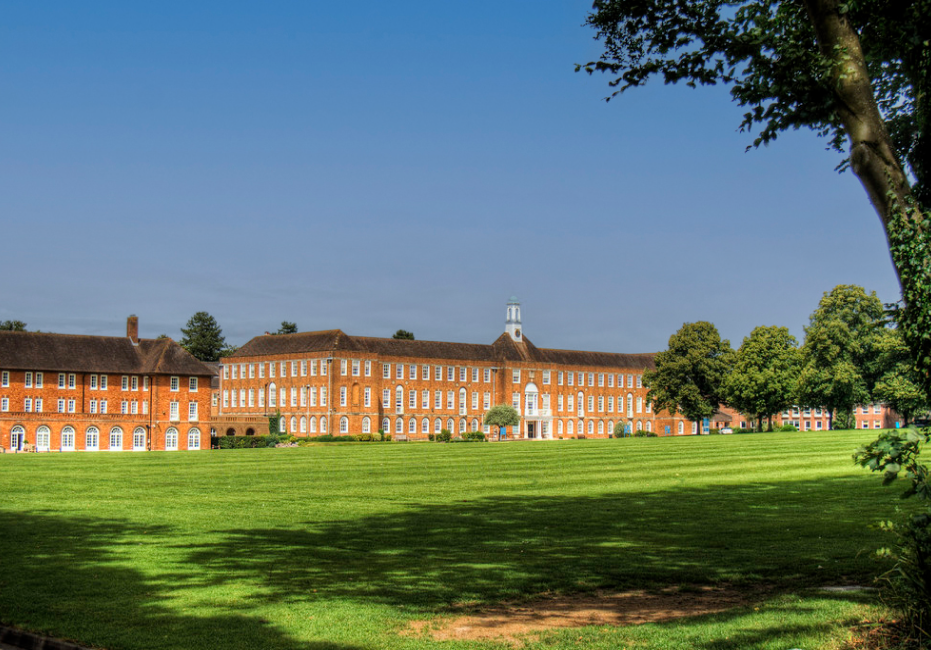
Admissions
Our friendly admissions team is here to guide you through each step from your initial enquiry to final enrollment. For more information on the admissions pathway visit our admissions page.
